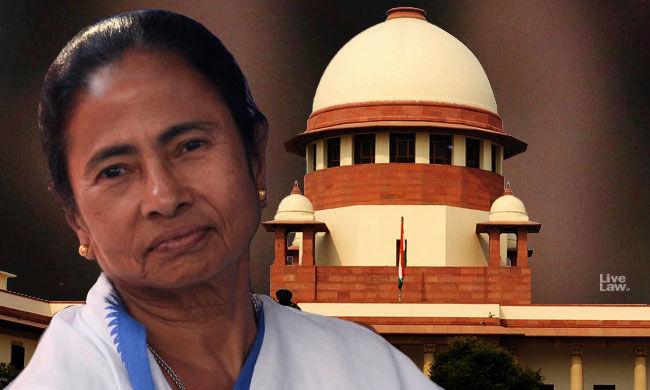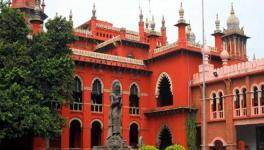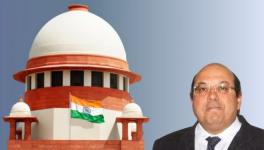Mamata Banerjee Meme: What For Did SC Ask Priyanka Sharma to Apologise?

Image Courtesy: Live Law
"Nobody has the right to not be offended. That right doesn't exist in any declaration I have ever read. If you are offended, it is your problem, and frankly, lots of things offend lots of people." -- Salman Rushdie.
In India, however, our politicians, our businessmen, and surprisingly at times even our courts often seem to disagree with Rushdie. India ranked 140th out of 180 countries in the Reporters Without Borders' 2019 global Press Freedom Index, just two spots above Pakistan. This rank can be attributed, in no small part, to the rampant use of criminal defamation law against journalists.
As most of these cases are only instituted to thwart free speech and fail to rise to the level the law requires them to, most of them do not culminate in a conviction and we breathe a sigh of relief as our courts are sure to deliver justice. However, even if the accused is acquitted at the end of a trial, she has by that time spent a considerable amount of time, money, and an incalculable amount of anxiety cost.
The sigh of relief I just spoke of earlier at the thought of our courts of law being there to defend free speech in the face of an increasingly defensive and litigious population is the centerpiece of this article— for what if it does not do so?
Recently, Priyanka Sharma, a BJP Yuva Morcha leader in West Bengal, was arrested for sharing a meme in which she transposed the face of the Chief Minister of West Bengal, Mamata Banerjee, onto the body of Priyanka Chopra at the Met Gala in New York, US.
In the heat of the general elections with fiery speeches, threats of slaps (of democracy), refusal to BJP MP and Party President Amit Shah to land his helicopter in the state twice, and the standoff between the CBI and the WB police, one is hardly surprised at the heavy-handedness of the State of West Bengal. What is worrying, in fact, is the role played by the judiciary.
Priyanka Sharma, after arrest and upon production before the magistrate, was sent to 14 days’ judicial custody. The offence, if any, committed by her could ostensibly be one of criminal defamation, punishable under Section 500 of the Indian Penal Code, 1860 ('IPC'), which in addition to being a bailable offence entitling her to be enlarged on bail as a matter of right is a non-cognizable case.
However, given that the FIR was reportedly lodged in the Cyber Cell of the Howrah City Police, understandably the provisions of the Information Technology Act, 2000 ('IT Act') must have been invoked. Chapter XI of the IT Act provides for 'Offences', the marginal notes (headings) of all the comprising sections of which are listed hereunder:
- 65. Tampering with computer source documents.
- 66. Computer-related offences.
- 66A. Punishment for sending offensive messages through communication service, etc.
- 66B. Punishment for dishonestly receiving stolen computer resource or communication device.
- 66C. Punishment for identity theft.
- 66D. Punishment for cheating by personation by using computer resource.
- 66E. Punishment for violation of privacy.
- 66F. Punishment for cyber terrorism.
- 67. Punishment for publishing or transmitting obscene material in electronic form.
- 67A. Punishment for publishing or transmitting of material containing sexually explicit act, etc., in electronic form.
- 67B. Punishment for publishing or transmitting of material depicting children in sexually explicit act, etc., in electronic form.
- 71. Penalty for misrepresentation.
- 72. Penalty for Breach of confidentiality and privacy.
- 72A. Punishment for disclosure of information in breach of lawful contract.
- 73. Penalty for publishing electronic signature Certificate false in certain particulars.
On a bare perusal, it becomes clear that the sharing of a meme by Sharma does not prima-facie fall under any of the above-mentioned offences under the IT Act.
While prior to 2015, it may have violated Section 66A, the same was declared unconstitutional by the Hon'ble Apex Court in Shreya Singhal v. Union of India (2015) 5 SCC 1, which made a formidable case for the protection of the right to free speech and expression, a fundamental right guaranteed under Article 19(1)(a) of the Constitution of India.
Interestingly, it is reported by CNN that the State of West Bengal has since filed a closure report in the Court of the concerned CJM conceding that in fact no criminal offence is made out against the accused and that the case be closed.
This begs the question— on what basis did the learned Magistrate send her to 14 days' judicial custody?
The Hon'ble Apex court in the celebrated judgment in Arnesh Kumar v. State of Bihar held that arrest is not a punitive measure, but a preventive one. Only because the police have the power to arrest, does not mean they must mechanically exercise it, much less exercise it in a selective manner as a tool of harassment.
It was held that the learned the magistrate before whom an accused is produced and a case for custody is made out, has the foremost solemn duty of examining whether the arrest itself is legal and warranted. Section 41 of the Code of Criminal Procedure, 1973 (Cr.P.C.) provides for arrests by police without a warrant. It lays down that in case of offences that are not heinous, the police, before making arrests, must satisfy itself (i) of the reason to believe that the accused has committed the offence and (ii) that the arrest is necessary to prevent such person from committing any further offence, for proper investigation of the offence, to prevent the person from tampering with evidence, to prevent the person from influencing witnesses, or to prevent the person from absconding.
Since the learned magistrate granted 14 days' judicial custody, it is to be presumed that the case for it was made to the Court's satisfaction.
It is, however, to be noted that the lawyers in West Bengal are on strike and thus it may have transpired that no (effective) assistance was provided to the Court in adjudicating the matter. The cessation of legal representation in the state led to the accused approaching the Apex Court by way of a habeas corpus writ petition, invoking the extraordinary power of the Hon'ble Supreme Court of India.
Appearing for the Accused, Neeraj Kishan Kaul, ld. Senior Advocate, advanced an impassioned case for free speech and political satire. The vacation bench, comprising Indira Banerjee and Sanjiv Khanna, JJ. in a succinct order, directed that the detenue be enlarged on bail immediately.
Interestingly, the order also directed Sharma to tender a written apology for sharing the meme. The grounds of bail in criminal jurisprudence are many, ranging from and often striking a balance between the personal liberty and presumption of innocence of the accused, and the interest of the State in prosecuting the criminal.
Tendering an apology to the alleged victim, however, is conspicuous only by its absence in either the Cr.P.C. or in any of the judgments of the Constitutional Courts, as being relevant and to be taken into consideration at the time of granting bail.
The media reported that the Court initially made the bail consequent upon the apology, only to later remove that condition and direct the apology to be made independent of the bail.
The Supreme Court of India in its wisdom and while exercising extraordinary criminal jurisdiction is unquestionable in its determination and in its power to so order, but knowing now that the State itself (in a matter of less than a week) does not believe any offence has been committed, it is to be wondered and academically discussed as to what exactly bore from the record for which the Supreme Court directed Priyanka Sharma, illegally detained and released in a habeas corpus petition, to apologise?
That freedom of speech and expression is non-negotiable is often repeated, including by the bench in this case, and yet we repeatedly find ourselves negotiating it to the subjective satisfaction of different Hon'ble judges, including in this case.
(Vaibhav Pratap Singh is an advocate at Delhi High Court. The opinions expressed in this article are the personal opinions of the author. The facts and opinions appearing in the article do not reflect the views of LiveLaw and LiveLaw does not assume any responsibility or liability for the same)
Get the latest reports & analysis with people's perspective on Protests, movements & deep analytical videos, discussions of the current affairs in your Telegram app. Subscribe to NewsClick's Telegram channel & get Real-Time updates on stories, as they get published on our website.
























